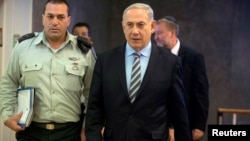JERUSALEM —
Iranian-born immigrants to Israel are drafted to its military intelligence units in disproportionately large numbers, an official report said on Thursday, reflecting high demand for Farsi speakers to monitor the Jewish state's arch-enemy.
Israeli Prime Minister Benjamin Netanyahu sees a mortal menace in Iran's disputed nuclear program and has long hinted his country was waging a covert campaign to track and foil it.
Those efforts, security sources say, have been stepped up since world powers and Tehran agreed an interim nuclear deal in November. Netanyahu condemned the accord as cover for Iran to pursue projects with bomb-making potential.
A story in the official Israeli military journal Bamahane included rare personnel data showing that, enrolling for mandatory national service, one in five Jewish immigrants from Iran go to intelligence units due to their native Farsi.
Describing this selection rate as “significantly higher” than the overall average among conscripts from other backgrounds, Bamahane quoted an Iranian immigration organizer as saying Farsi fluency was key.
“Bringing Iranian natives with a command of Farsi into the intelligence corps is a priority,” the organizer, Adi Bublil, said. “They have an advantage, as Farsi is not a common language among young men and women in the State of Israel.”
Israel's military intelligence corps is well-funded and staffed. Its Unit 8200 specializes in electronic eavesdropping and is often likened to the U.S. National Security Agency (NSA) or Britain's Government Communications Headquarters (GCHQ).
Military intelligence's civilian Israeli counterpart Mossad is widely assumed to have carried out more aggressive actions like sabotage in Iran, which denies seeking the bomb but whose often secretive nuclear projects stir Western suspicions.
According to Bamahane, “dozens” of Iranian-born Jews join the Israeli military each year. Immigration from the Islamic republic - whose Jewish minority numbers around 25,000 - to Israel is conducted discreetly and on a relatively small scale.
Last September, Israel's top-rated Channel Two TV aired footage of military intelligence soldiers in a Farsi class.
According to that report, Iranian-born troops were included in the language program, which lasts seven months and twins comprehension of technical terms with Farsi songs and Persian folklore designed to improve eavesdroppers' colloquial skills.
“We need to know everything [about Iran], from combat doctrines to weaponry to operational routines to slangs and codes,” said the training academy's commander, a lieutenant-colonel whose name was withheld under secrecy regulations.
Iran and the European Union were scheduled to resume nuclear talks in Geneva on Thursday. The negotiations have been overshadowed by a dispute over advanced Iranian research into centrifuges used to purify uranium.
Israeli Prime Minister Benjamin Netanyahu sees a mortal menace in Iran's disputed nuclear program and has long hinted his country was waging a covert campaign to track and foil it.
Those efforts, security sources say, have been stepped up since world powers and Tehran agreed an interim nuclear deal in November. Netanyahu condemned the accord as cover for Iran to pursue projects with bomb-making potential.
A story in the official Israeli military journal Bamahane included rare personnel data showing that, enrolling for mandatory national service, one in five Jewish immigrants from Iran go to intelligence units due to their native Farsi.
Describing this selection rate as “significantly higher” than the overall average among conscripts from other backgrounds, Bamahane quoted an Iranian immigration organizer as saying Farsi fluency was key.
“Bringing Iranian natives with a command of Farsi into the intelligence corps is a priority,” the organizer, Adi Bublil, said. “They have an advantage, as Farsi is not a common language among young men and women in the State of Israel.”
Israel's military intelligence corps is well-funded and staffed. Its Unit 8200 specializes in electronic eavesdropping and is often likened to the U.S. National Security Agency (NSA) or Britain's Government Communications Headquarters (GCHQ).
Military intelligence's civilian Israeli counterpart Mossad is widely assumed to have carried out more aggressive actions like sabotage in Iran, which denies seeking the bomb but whose often secretive nuclear projects stir Western suspicions.
According to Bamahane, “dozens” of Iranian-born Jews join the Israeli military each year. Immigration from the Islamic republic - whose Jewish minority numbers around 25,000 - to Israel is conducted discreetly and on a relatively small scale.
Last September, Israel's top-rated Channel Two TV aired footage of military intelligence soldiers in a Farsi class.
According to that report, Iranian-born troops were included in the language program, which lasts seven months and twins comprehension of technical terms with Farsi songs and Persian folklore designed to improve eavesdroppers' colloquial skills.
“We need to know everything [about Iran], from combat doctrines to weaponry to operational routines to slangs and codes,” said the training academy's commander, a lieutenant-colonel whose name was withheld under secrecy regulations.
Iran and the European Union were scheduled to resume nuclear talks in Geneva on Thursday. The negotiations have been overshadowed by a dispute over advanced Iranian research into centrifuges used to purify uranium.





